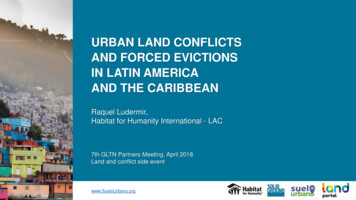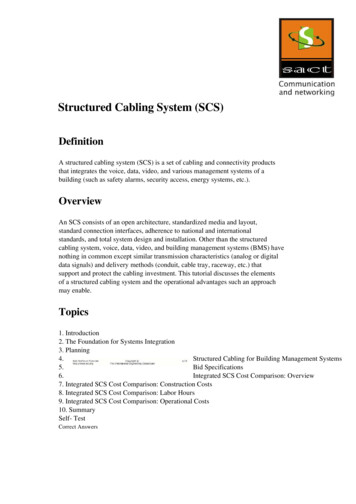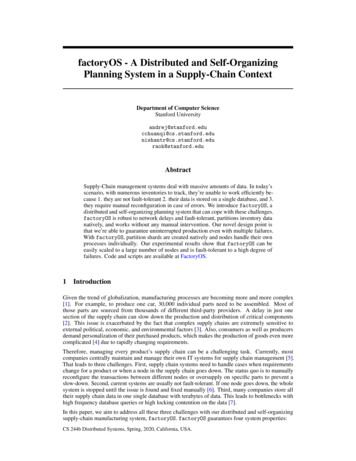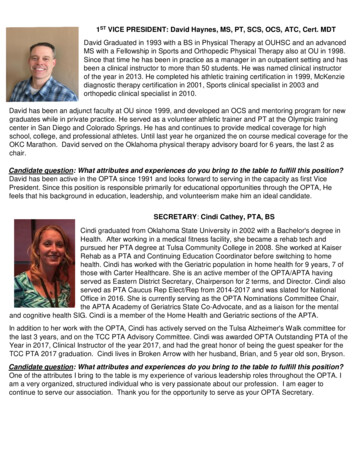
Transcription
Issue 66March 2021Mental health andpsychosocial supportPlus special features on:Data and displacementMissing migrants
Forced Migration Review(FMR) provides a forum for theregular exchange of practicalexperience, information andideas between researchers,refugees and internally displacedpeople, and those who workwith them. It is published inEnglish, Arabic, Spanish andFrench by the Refugee StudiesCentre of the Oxford Departmentof International Development,University of Oxford.StaffMarion Couldrey &Alice Philip (Editors)Maureen Schoenfeld (Financeand Promotion Assistant)Sharon Ellis (Assistant)Forced Migration ReviewRefugee Studies CentreOxford Department of InternationalDevelopment, University of Oxford,3 Mansfield Road,Oxford OX1 3TB, UKfmr@qeh.ox.ac.ukTel: 44 (0)1865 281700www.fmreview.orgDisclaimer: Opinions in FMR do notnecessarily reflect the views of theEditors, the Refugee Studies Centreor the University of Oxford.Copyright: FMR is an Open Accesspublication. For details visitwww.fmreview.org/copyright.ISSN 1460-9819Designed by:Art24 www.art24.co.ukPrinted by:Oxuniprintwww.oxuniprint.co.ukWFrom the editorse had not expected to be publishing yet another issue of FMR underCOVID-19 restrictions – and to be welcoming new Co-Editor AlicePhilip to the team without even being able to meet in person! But thanksto the collaboration of our authors and donors, we are pleased to be ableto present the latest issue with its three features.The main feature on Mental health and psychosocial support (MHPSS)seems particularly timely during the current pandemic when the mentalhealth impacts of displacement are distressingly compounded by theimpact of COVID-19. The 15 articles in this feature explore the importanceof MHPSS and the challenges inherent in this field, debate MHPSSinitiatives and their application in different contexts, and advocate forstrengthened collaboration and commitment – and new ways of thinking.The authors in our Data and displacement feature discuss recentadvances in gathering and using data, the challenges that remain, andnew approaches, including in the face of pandemic-imposed restrictions.Unknown numbers of migrants die or disappear during their perilousjourneys, and their families are often left in limbo. In our Missing migrantsfeature, authors explore initiatives to improve data gathering and sharing,identification of remains, and assistance for families left behind.We would like to thank Alastair Ager, Julia Black, Kate Dearden, JamesEaton-Lee, Matthew Gibney, Rachel Hastie, Maurice Herson, MaryanneLoughry and Domenico Tabasso for their assistance with this issue, and allthose who have provided financial support for this issue in particular andfor FMR in general. Our funders are acknowledged opposite.This magazine and the accompanying Editors’ briefing are available onlineand in print at www.fmreview.org/issue66. They will also be available inArabic and Spanish. Unfortunately, shortage of funding means we areunable to publish this issue in French.Forthcoming: Our next issue will include a major feature on Public healthand WASH, and a shorter feature on Non-signatory States and theinternational refugee regime. See www.fmreview.org/forthcoming.With best wishesMarion Couldrey and Alice PhilipEditors, Forced Migration ReviewFront cover image:Rose Sakouma holds hands with another member of the Women Standingassociation in Begoua, Central African Republic. When attacks began in her area,she escaped with her daughters and grandchildren: “I was traumatised, seeingkillings, bullets and machetes, heads cut off and people strangled. My husbandwas killed while escaping. Without Women Standing, I wouldn’t be alive today.When we meet, we reassure each other.”UNHCR/Adrienne Surprenant
Forced Migration Review issue 66 www.fmreview.org/issue66Mental health and psychosocial support4Foreword: No health without mental health5Creative tensions in the framing of MHPSS8Engagement of protection actors in MHPSS: theneed for cross-sectoral cooperationSigrid KaagAlastair AgerSarah Harrison, William S Chemaly, Fahmy Hanna,Nancy Polutan-Teulières and Peter Ventevogel12 Urban mental health and psychosocial supportin EgyptNancy Baron15 Culture bias and MHPSSJoanne Michelle F Ocampo, Mhd Nour Audi and MikeWessells17 The importance of teacher well-being for studentmental health and resilient education systemsDanielle Falk, Paul Frisoli and Emily Varni21 Faith-sensitive MHPSS for humanitarianpractitionersLeonie Harsch, Corrie van der Ven and Olivia Wilkinson24 Faith and MHPSS among displaced MuslimwomenKathleen Rutledge, Sandra Iman Pertek, MohammadAbo-Hilal and Atallah Fitzgibbon27 Roles and responsibilities of cultural mediatorsEmilie Venables, Katherine Whitehouse, CaterinaSpissu, Lilian Pizzi, Ahmad Al Rousan andStefano di Carlo29 GBV and mental health among refugee and hostcommunity women in LebanonAlina Potts, Rassil Barada and Angela Bourassa37 Adaptation of MHPSS in camps in the contextof COVID-19Jordan Balletto, Hannah Bergbower, Alice Tang andFernando Ona40 From place to space: field insights on adaptingchild-friendly spaces during COVID-19Janna Metzler, Aimyleen Gabriel, Frieda Mwebe andKevin Savage43 Therapy in Uganda: a failed MHPSS approach inthe face of structural issuesCostanza TorreData and displacement46 Data and evidence on forced displacement:reflections on progress and challengesEwen Macleod50 Aligning humanitarian surveys with internationalstatistical standardsFelix Schmieding52 Including refugees and IDPs in national datasystemsNatalia Krynsky Baal55 The pitfalls and potential of high-frequency phonesurveys during COVID-19Jeffery C TannerMissing migrants58 Measuring migrant deaths and disappearancesAndrea Garcia Borja and Julia Black61 Tackling DNA data-sharing challengesSara H Katsanis, Diana Madden, Courtney C Siegert,Eduardo Canales and Kate Spradley64 What about those left behind?Marta Sánchez Dionis and Kate Dearden31 Community-based approaches to MHPSS66 The search for truth, justice and closure during34 Physical activity, mental health and psychosocial69 Missing migrants and their families: a call forDmytro Nersisian, Marine Ragueneau, Heide Riederand Guglielmo Schinina’supportSimon Rosenbaum, Alastair Ager, Leslie Snider, AjwangWarria, Holly Collison, Sabrina Hermosilla andDavy Vancampfortthe pandemicDanai Angeligreater international cooperationSylvie van Lammeren and Florian von König72 Loss, hope, actionImed Soltani, Odessa Gonzalez Benson andVadim BesprozvanyThank you!FMR is dependent on external funding for all aspects of its work. Some sources of funding provide annual, corefunding to underpin our work; others fund specific features; and other sources are more individual – readers andauthors who want to support FMR’s work.We are grateful to the following for supporting FMR 66: ACT Alliance/Kerk in Actie GxJ Lab at Lurie Children’s IFRC Psychosocial Centre IOM’s Global Migration Data Analysis Centre Scientia A/Prof Simon Rosenbaum,UNSW Sydney Swiss Federal Department of Foreign Affairs Tufts University School of Medicine World Vision UKWe would also like to thank: ADRA International Australian Research Council Catholic Relief Services USCCB Danish Refugee Council European Research Council (Horizon 2020 award, grant number 716968) Government of the Principality of Liechtenstein International Committee of the Red Cross InternationalOrganization for Migration Jesuit Refugee Service Luxembourg Ministry of Foreign and European Affairs Oxfam Rosa Luxemburg Stiftung UNHCR Women’s Refugee Commission World Bank–UNHCR JointData Center on Forced Displacement
FMR 66Mental health and psychosocial support4www.fmreview.org/issue66March 2021Foreword: No health without mental healthSigrid KaagMental health and psychosocial support (MHPSS) is vital for our individual and collectivewell-being, especially now.“There is no health without mental health.”UN Secretary-General António Guterresreaffirmed this simple but powerfulmessage in May 2020.1 In a timely effort tosound the alarm, he cautioned that a globalupsurge in the prevalence and severityof mental health problems as a result ofCOVID-19 was very likely, and that actionand funding were needed urgently to tacklethe devastating impact of the pandemicon access to mental health services.A WHO survey2 in October 2020 indicatedthat COVID-19 had partially disruptedmental health services in 93% of countriesworldwide at a time when demand for mentalhealth support is rising. Mental health andpsychosocial support (MHPSS) is vital forour individual and collective well-being,especially now. MHPSS is even more crucialfor the most vulnerable already living onthe margins of society: people who havebeen hit by conflict or disaster, and whohave been forcibly displaced or are on themove. Many of them have already losttheir homes, communities, loved ones andlivelihoods. The pandemic adds further totheir distress and precarious circumstances.The Netherlands strongly advocatesrecognising the importance of MHPSS forpeople and communities affected by crisis,and is committed to ensuring an MHPSSinclusive approach in all humanitarianefforts, as well as in conflict preventionand peacebuilding programming.3Together with like-minded countries andhumanitarian agencies, we are makingprogress. In the past few years MHPSS hasfinally been designated a priority on theinternational agenda. Indeed, importantagreements on including MHPSS as part ofany humanitarian response were reachedin 2019, with the Mind the Mind NowConference and its Amsterdam ConferenceDeclaration4 whereby a coalition of 28countries and 10 organisations pledged toaddress the mental health and psychosocialneeds of people affected by emergencies.Integral to this is the need to:promote the integration of MHPSS into allcrisis response from the outsetintegrate basic psychosocial skills into thetraining of every humanitarian workerattend to the psychosocial well-being ofhumanitarian staff, first responders andvolunteers.These principles are high on the agendaof the IASC’s MHPSS Reference Group,5and are also reflected in the December2019 resolution6 by the International RedCross and Red Crescent Movement, whichcalls for the integration of MHPSS intoall aspects of its emergency response.However, although important steps havebeen taken, given the increasing levels ofpoor mental health we urgently need to scaleup our investments – in funding as well asin political and policy efforts and in humanresources development. In December 2020, at ahigh-level meeting7 during the HumanitarianWeek, several UN humanitarian agenciesissued a joint call for action, urging partiesto honour earlier commitments to providecross-sectoral MHPSS to meet the needs ofpeople affected by emergencies.8 In January2021, the Executive Board of the WorldHealth Organization adopted a decision onmental health preparedness and responsefor public health emergencies.9 It calls onthe World Health Assembly 2021 to endorsethe updated mental health action plan,on Member States to allocate adequatefunding, and on WHO to strengthen itscapacity in the area of mental health.MHPSS is not a luxury, an afterthought,or an additional burden. It is an effectivetool because it helps individuals, families
FMR 66Mental health and psychosocial supportMarch 2021www.fmreview.org/issue66UNHCR/Caroline Gluckand communities to release their potential torecover, maintain or regain their resilienceand perspective, to rebuild social cohesion,to resume their livelihoods, and to fosterreconciliation. Unlocking this potentialthrough MHPSS is essential to alleviatingthe effects of conflict, natural disasters,displacement and pandemics. And it canbe done – provided that we work in closepartnership with affected populations,grassroots organisations and civil societygroups, making use of and building onexisting experience, expertise and tools.I very much welcome this issue of ForcedMigration Review dedicated to MHPSS,relevant for practitioners, policymakersand researchers alike. It is an excellentgateway to a rich body of knowledge andexpertise that need to be disseminated.And I call on all governments and actors towork collaboratively and with strengthenedcommitment to address the mental healthneeds of displaced people around theworld and to make full use of the potentialof MHPSS. Because MHPSS helps to keepboth our minds and our societies at peace.Sigrid KaagMinister for Foreign Trade and DevelopmentCooperation of the Kingdom of the NetherlandsMHPSS@minbuza.nl1. bit.ly/Guterres-mental-health-covid-video2. WHO (2020) The impact of COVID-19 on mental, neurological andsubstance use services: results of a rapid 24553. See ‘Enhanced Integration of MHPSS & Peacebuilding’, October2020 bit.ly/MHPSS-peacebuilding-video-Oct20204. International Conference on Mental Health and PsychosocialSupport in Crisis Situations – Amsterdam, 7-8 October erdam Declaration bit.ly/Amsterdam-Declaration-Oct20195. bit.ly/IASC-MHPSS6. bit.ly/RCRC-MHPSS-Resolution-Dec20207. See bit.ly/high-level-MHPSS-crises-Dec2020-video8. bit.ly/IASC-MHPSS-CallForAction-Dec20209. WHO (2021) Promoting mental health preparedness and response forpublic health emergencieshttps://apps.who.int/gb/ebwha/pdf files/EB148/B148(3)-en.pdfCreative tensions in the framing of MHPSSAlastair AgerThe tensions and challenges involved in the development over recent decades of the fieldof practice now known as mental health and psychosocial support (MHPSS) will continue toshape questions of implementation, prioritisation and impact.The earliest use of the term ‘psychosocial’in the context of forced migration that Ihave found is by Hertha Kraus in a 1939Special Issue of the The Annals of the AmericanAcademy of Political and Social Science.1 Herpaper addressed the sources of stress forthose resettling in “a strange country” andnoted the psychological and social nature ofthese beyond the legal, political and economicstressors considered by other authors.The term only came into wider use in thefield in the 1990s, however. Barbara HarrellBond had written a chapter in her 1986classic Imposing Aid on “the over-socializedconcept of man” in which she had takenthe humanitarian field to task for its neglectof the psychological experience of forceddisplacement. In 1993 I was asked by her toput together a review of the issue of refugeemental health for Harvard’s Global MentalHealth report.2 However, it made only passingreference to the psychosocial concept, largelyto hint at the broader social and culturalcontext shaping refugee mental health.A subtle hint was inadequate toaddress the divisions that developed inthis fledgling field later in that decade. TheRwandan genocide and, particularly, thewars following the breakup of the formerYugoslavia brought the human side ofconflict and displacement into both publicawareness and humanitarian response.However, addressing mental health issuesin populations subject to ethnic-politicalpersecution also brought to the surface sharptensions between normative psychiatric5
FMR 66Mental health and psychosocial support6www.fmreview.org/issue66responses and broader community-basedapproaches.3 Derek Summerfield and PatBracken were particularly strong critics ofthe imposition of Western frames of illnesson the victims of human rights violationsand oppression. A meeting convened inthe late 1990s by the American Red Crossto consider appropriate means of responserevealed disparate factions with strongideological and methodological positions. Anumber of groups attending noted “a lack ofconsensus on goals, strategies and impacts”.Forging a consensusAs a result, in 2000 Carolyn Makinsonbrought together a number of leadinginternational NGOs working in this areawith academic groups from institutions thathad engaged with emerging approaches intoa Psychosocial Working Group to developa shared framing of the field.4 The groupproposed that psychosocial interventionsshould be defined by an interest in humancapital (notably in relation to the impact ofmental ill-health on individual well-being), insocial ecology (the relationships and broadersocial fabric disrupted by forced migration),and in culture and values (especially theerosion of rights and cultural norms). Theinteraction between these three domainswas also emphasised. The core challenge ofplanning appropriate interventions arosein negotiating the provision of supports inthese domains for an affected community ina manner that reflected genuine partnershiprather than neo-colonial imposition. Inpresentations to local actors in-country,it was always discussion of this last issuethat received the greatest attention.Subsequently, two members of thisworking group, Mark Van Ommeren andMike Wessells, were invited to co-chair anInter-Agency Standing Committee (IASC)process for the development of what becamethe IASC Guidelines on Mental Health andPsychosocial Support in Emergency Settings. Thisinitiative steered a process which focused onpractical implementation rather than theory,and on wide local and national consultationin order to address the concerns aboutimposition that had marked the precedingMarch 2021decade. The guidelines, published in 2007,5succeeded in providing a framework that bothintegrated diverse disciplinary perspectivesand was transparently accessible to diverseactors, local and international. In doing so,it accommodated major tensions withinthe field that had undermined coherenceand collaboration since its inception.A maturing, evidence-based fieldThe guidelines were substantially basedon emerging best practice, although it wasrecognised that the evidence base supportingthem was comparatively weak. While thesubsequent formulation of supplementaryguidelines for specific situations, such asthe Ebola outbreak, were important, themost significant development in subsequentyears has been gathering this much morerobust evidence base. This included a majorresearch agenda-setting exercise by WietseTol and colleagues6 that identified a numberof priority questions related to modalities ofintervention; these were family- and schoolbased approaches, assessment methods, andindicators for monitoring and evaluation.Other questions related to identifyingstressors, problems and protective factorsfrom the perspective of affected populations,sociocultural adaptation of interventions,and whether interventions address locallyperceived needs. The team facilitating thisconsensus exercise observed that the agendaemphasised “the generation of practicalknowledge that could translate to immediatetangible benefits for programming inhumanitarian settings, rather than addressingthe key debates that have dominated theacademic literature”. While this may be true,these two clusters of research questionsshow some resonance with a core tensionwithin the MHPSS framing: the formeremphasising the identification of effectiveand generalisable programme interventions,measures and indicators, with the latteremphasising the need for contextualisation.With sustained support for researchstudies in the area through programmes suchas Elrha’s R2HC programme,7 MHPSS movedfrom being one of the poorest supportedareas of humanitarian action in terms of
FMR 66Mental health and psychosocial supportMarch 2021evidence to one of the best. Much of the workhas focused on documenting the impact ofspecific intervention approaches that arecurrently implemented at scale, such asstructured activities within Child FriendlySpaces, or that are potentially scalable, suchas Programme Management Plus (PM ). Thiswork has contributed significantly to thegoal of identifying impactful programmaticapproaches, but also often points to theimportance of the goal of accommodatingthe diversity of contexts to which suchinterventions need to be adapted. The fieldhas thus matured to the point where thefocus is on refining and strengthening proveninterventions, or finding more effective orefficient modalities for their delivery.www.fmreview.org/issue66interventions. However, there are some verypromising recent examples of contextualadaptation being considered as a task tobe undertaken as a step-by-step processrather than as a vaguely stated ambition.Relieving suffering or driving long-termchange: Evaluations that have lookedat longer-term impacts of psychosocialinterventions have frequently found nomajor benefits for those in the programmescompared with those not receivinginterventions.8 Typically, this finding is notthe result of a ‘drop off’ in the well-beingof those who have attended programmingbut is rather the result of those who did notattend programming managing to ‘catchup’ in terms of adjustment. Despite shortterm benefits being noted, the interventionCreative tensionsis sometimes reported as having no impact.If, from the turbulence of the 1990s, the fieldThis raises the issue of whether psychosocialformed in the 2000s and matured in theprogramming should be aimed principally2010s, what prospect is there for the field inat the relief of suffering or at shaping longerthe next decade? On the research side, thereterm trajectories of adjustment. Promisesis a new research agenda-setting exerciseof longer-term benefit may reflect an undueunderway with support from a numbercapture by a longer-term resilience narrativeof donor agencies and intergovernmentalorganisations, reflecting the place that MHPSS rather than a relief of suffering narrative. Ibelieve that the positioning of psychosocialhas secured in humanitarian strategy. Thisinterventions as supporting populations inis a consensus-building exercise engagingdistress rather than demonstrating longwith diverse national and internationalterm benefits may be usefully established asstakeholders, whose outcome will notthe baseline expectation for the field. Thisbe known until well into 2021. However,is not to say that long-term benefits cannotthere are at least three issues that seembe secured but it may be appropriate forlikely to emerge from the exercise, andpsychosocial interventions to be judged in thethat will continue to engage practitionerssame way that food, shelter and most healthand researchers alike in the next decade.interventions are primarily judged – that is,on their amelioration of the suffering and riskScaling, fidelity and contextual adaptation:The challenge of balancing the development of in affected populations during an emergency,generalisable, effective interventions with the rather than on long-term trajectories of foodsecurity, settlement or physical well-being.need for cultural adaptation and sensitivityto the agendas of local actors will remain aFocused intervention versus strategy ofkey feature, if not the key feature, of work forengagement: Finally, I anticipate debatessome time to come. This is a significant task,continuing about the relative priority ofreflecting the recurrent MHPSS challengefocused MHPSS intervention programmes –of combining technical generalisabilitysuch as tackling severe mental distress andwith contextual understanding andthe consequences of gender-based violence –engagement, and scaling interventionsand broader-focused community engagementfor access by a much greater proportionstrategies promoting agency, ownership andof affected communities while retainingpeace-building. We can anticipate, however,fidelity to the active components of proven7
FMR 668Mental health and psychosocial supportwww.fmreview.org/issue66March 2021the development of clearer framing andtheories of change linking these differentforms of work. The breadth of influences onwell-being reflected in community-basedapproaches was acknowledged in Kraus’sinitial use of the term to describe the forcesshaping the experience of the resettlingrefugee and in much literature since; the valueof focused, targeted interventions addressingpsychological and emotional distress isnow also endorsed by a rich literature.International Mental and Behavioral Health, et/fmo:1082/PDFAlastair Ager aager@qmu.ac.uk @AlastairAgerInstitute for Global Health and Development,Queen Margaret University; Mailman School ofPublic Health, Columbia University7. Tol W et al (2020) ‘Improving mental health and psychosocialwellbeing in humanitarian settings: reflections on research fundedthrough R2HC’, Conflict and Health 14https://doi.org/10.1186/s13031-020-00317-61. Kraus H (1939) ‘Starting Life Anew in a Strange Country’,The Annals of the American Academy of Political and Social Science,Vol 203 www.jstor.org/stable/10218903. Ager A (1997) ‘Tensions in the psychosocial discourse:implications for the planning of interventions with war-affectedpopulations’, Development in Practice 7 (4)www.jstor.org/stable/4029006?seq 14. Psychosocial Working Group (2002) Psychosocial Intervention inComplex Emergencies: a Conceptual Frameworkbit.ly/PWG-conceptual-framework-20025. IASC (2007) IASC Guidelines on Mental Health and PsychosocialSupport in Emergency Settings bit.ly/IASC-MHPSS-guidelines6. Tol W et al (2011) ‘Research Priorities for Mental Health andPsychosocial Support in Humanitarian Settings’ PLoS Med 8(9)e1001096 doi.org/10.1371/journal.pmed.10010968. Panter-Brick C, Dajani R, Eggerman M, Hermosilla S, SancilioA and Ager A (2017) ‘Insecurity, distress and mental health:experimental and randomized controlled trials of a psychosocialintervention for youth affected by the Syrian crisis’, Journal of ChildPsychology and Psychiatry 59 https://doi.org/10.1111/jcpp.128322. Ager A (1993) ‘Mental health in refugee populations: A review’,Refugee Studies Programme, University of Oxford, for Project onEngagement of protection actors in MHPSS: the needfor cross-sectoral cooperationSarah Harrison, William S Chemaly, Fahmy Hanna, Nancy Polutan-Teulières andPeter VentevogelFostering the mental health and psychosocial well-being – within a comprehensive protectiveresponse – of people affected by humanitarian emergencies requires multi-sectoral actionand coordination.Many people living in areas affected byviolence and conflict experience a negativeimpact on their mental health, and one infive develop a mental health condition,which is much higher than for populationsnot affected by conflict.¹ Affected peoplemay require focused psychosocial supportor clinical mental health and psychologicalservices. First and foremost, however, affectedpeople need supportive social networksand to have their basic needs and securitymet in ways that preserve their dignityand agency, and uphold their rights.Over the last decade, supporting themental health and psychosocial wellbeing of people affected by conflicts,disasters and public health emergencieshas gained recognition as a vital part of thehumanitarian response.2 The 2007 IASCGuidelines on Mental Health and PsychosocialSupport in Emergency Settings have positionedMHPSS as an interdisciplinary field thatrequires a collaborative approach betweenmultiple humanitarian disciplines.3 In 2019,the global leadership for humanitarianresponse (the IASC Principals) re-affirmedthe decision to “treat MHPSS as a crosscutting issue that has relevance withinhealth, protection, nutrition, education andCamp Coordination and Camp Managementsectors/clusters, in all emergencies”.⁴Humanitarian programmes tend to focuson a specific sector while individuals, familiesand communities in emergency settings oftenpresent with multiple problems and needsthat cut across sectoral definitions. Since 2007,strong technical tools for specific MHPSSinterventions have been developed in areas
FMR 66Mental health and psychosocial supportMarch 2021such as health, nutrition, education, genderbased violence and child protection. But thewhole humanitarian response needs to adoptan MHPSS approach. This implies providinghumanitarian assistance in ways that supportthe mental health and psychosocial well-beingof persons of concern even when the primaryfocus of the intervention is sectoral. In short,promoting and protecting psychological wellbeing (positive mental health) and deliveringMHPSS services must be firmly embeddedwithin sectors and delivered across sectors.Objectives, resources and structurewww.fmreview.org/issue66humanitarian settings, serving as platformswhere agencies involved in MHPSSprogramming can discuss programmingissues. These are technical forums that workacross clusters and sectors – and with focalpoints in these where relevant – but donot replace the role of clusters and sectors,which retain accountability for activities andreporting. The exact configuration and coleadership should be decided at country levelby the involved MHPSS actors but MHPSSWGs are ideally co-chaired by a healthagency and a protection agency to balancediverse and complementary approaches.Integrating community-based MHPSSapproaches into other sectors often involvesworking in a different way rather than takingon new tasks: providing existing services inan effective way (focusing on dignity, agencyand participation of affected populations)rather than requiring stand-alone‘psychosocial programmes’ to be developed.6A protective environmentOne of the four protection principles in theSphere Handbook is to “assist people torecover from the physical and psychologicaleffects of threatened or actual violence,coercion or deliberate deprivation”.⁷ It isessential therefore that all humanitarianUNHCR/Will SwansonAddressing MHPSS requires a clearly definedspace for the topic within humanitariancoordination structures. The IASC Principalsagreed in their 2019 meeting to “reflectMHPSS indicators in relevant planningdocuments and establish dedicated budgetlines, as well as specific MHPSS codeswithin financial tracking systems andto support the creation and the work ofcountry-level MHPSS Working Groups inall migration, refugee and humanitariancontexts as crosscutting groups”. UN agenciesrecently
Mental health and psychosocial support 4 Foreword: No health without mental health Sigrid Kaag 5 Creative tensions in the framing of MHPSS Alastair Ager 8 Engagement of protection actors in MHPSS: the need f











